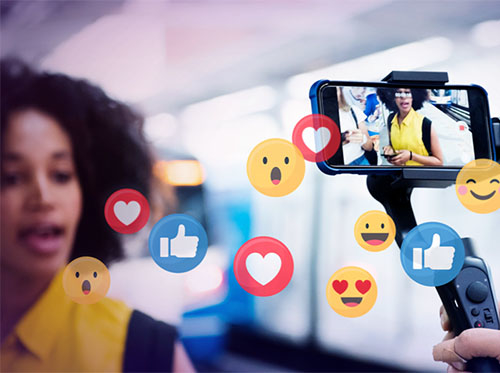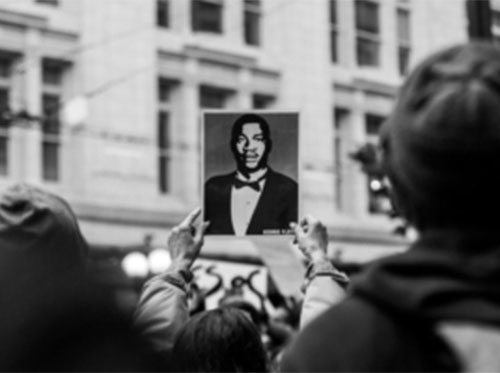Profits and Purpose: Crooked Media, Black Rifle Coffee, Ben & Jerry’s
Proactive Purpose vs. Reflexive Rhetoric
In response to the ongoing protest movement, there’s been an outpouring of public statements from consumer brands – from global conglomerates to local restaurants – voicing their solidarity with the Black Lives Matter movement.
Predictably, there’s been backlash for brands perceived as “talking the talk, without walking the walk”. The Atlantic recently posited, “Companies are trying to say the right thing without upsetting anyone, walking right up to the line of politics without stepping one toe over it.”
Some brands have gone beyond words and have pledged significant charitable donations. Others have reformed aspects of their business that contribute to a culture of inequality (e.g. Lego, NASCAR, Republic Records, ViacomCBS). Progress is impossible without an initial step forward. We hope these steps continue once the national spotlight inevitably moves elsewhere.
However, the companies that inspire us the most don’t need to develop a substantive public position or initiative in reaction to consumer outcries. They have purpose/values-driven DNA. They are built for this crisis and the next one (whenever and whatever it will be). They are built for a generation of consumers that demand more from a brand than just a product.
Profits AND Purpose
Debates rage on about how businesses can function as forces for social progress beyond short-term cosmetic responses to consumer outcries. The prevailing notion is that brands need to choose between doing the right thing and doing the profitable thing.
We disagree.
Maximizing profits and social good must be viewed as a unified effort. 65% of consumers based purchases on the values and actions of company leaders, and 47% stopped purchasing from a brand in response to a disappointing moment.
One revealing example of this evolving consumer and corporate consciousness is Michael Jordan and his Nike-backed Jordan brand. In 1990, MJ famously justified his deliberate silence on a North Carolina senate race, in which racial justice was a central issue, by saying “Republicans buy sneakers too”. Last week, Michael Jordan and Jordan Brand publicly pledged to donate $100M to organizations that advance racial equality.
While a company risks short-term financial backlash by publicly aligning with certain values, the brand loyalty and affinity generated through a purpose-led approach results in sustainable, long-term revenue growth. The loss of customers who are alienated by your values will be outweighed by the increased lifetime value of consumers who identify with these values and become passionate, loyal, brand evangelists as a result.
The three companies below support this thesis and inspire us to build a world where businesses are as committed to purpose as they are profits. And by purpose, we don’t just mean public words, statements, and vague “values” – but action. These companies not only state their beliefs publicly and proudly, but they also mobilize their resources to take action on the issues that matter to them. They leverage their influence to inspire their consumers and educate them on how they can take action too.
Ben & Jerry’s
Alan Jope, the CEO of Ben & Jerry’s parent company, Unilever, summed up the company’s ethos:
“We’ve been operating a multi-stakeholder model for about 10 years. We believe that if we look after our employees and our customers, if we worry about society and the planet, if we take care of our supplier partners, then our shareholders will be well rewarded…We shouldn’t talk about purpose over profits. We truly believe that by positioning our brands on doing real good, by running our supply chain in a sustainable way, by being a responsible employer and creating great opportunities for people, a byproduct will be better financial performance. And I really hate to set up some trade-off on purpose vs. profits…Our company is guided by three deeply held beliefs: that brands with purpose grow, companies with purpose last, and people with purpose thrive…This is a time when people need trusted brands.”
This statement was actually made in regards to the COVID crisis. But the fact that it’s equally relevant today is a testament to the perpetual utility of this “multi-stakeholder model”.
According to its mission statement, “Ben & Jerry’s operates on a three-part mission that aims to create linked prosperity for everyone that’s connected to our business: suppliers, employees, farmers, franchisees, customers, and neighbors alike.”
The three prongs of this mission include:
-
Economic Mission: “To operate the Company on a sustainable financial basis of profitable growth, increasing value for our stakeholders and expanding opportunities for development and career growth for our employees.”
-
Social Mission: “To operate the Company in a way that actively recognizes the central role that business plays in society by initiating innovative ways to improve the quality of life locally, nationally and internationally.”
-
Product Mission: “To make, distribute and sell the finest quality ice cream and euphoric concoctions with a continued commitment to incorporating wholesome, natural ingredients and promoting business practices that respect the Earth and the Environment.”
How does this mission manifest itself in the company’s day-to-day operations?
Ben & Jerry’s has actively committed to ten social causes: racial justice, democracy, refugees, climate justice, LGBT equality, fairtrade, peace building, support for GMO labeling, “Getting the dough out of politics”, and recombinant bovine growth hormone.
The company does not merely provide lip service when these causes are in the news. Rather, they’ve proactively and consistently mobilized their resources and platform towards making a real difference across each one of those causes, including educating their customers on how to do the same.
After the tragic death of George Floyd, Ben & Jerry’s not only penned a 700 word manifesto on dismantling white supremacy, but also made specific calls to action; it called for Congress to pass H.R 40 legislation, and called on the DOJ to reinvigorate its Civil Rights division and reinstate certain policies rolled back by the Trump administration to curb police abuses.
But Ben & Jerry’s commitment to racial justice is not a new initiative in response to the recent news cycle. The company was already partnered with non-profits like the North Carolina NAACP, Color of Change, Demos, and The Dream Corps – and it has charitable partners for each of its 10 social causes. Last month on Mother’s Day, it used the occasion to circulate a petition for the National Bailout Collective. A few weeks prior, on 4/20, the company used the “holiday” to circulate a pre-drafted email in support of the MORE Act that consumers could easily send to their Congress representative.
For Ben & Jerry’s, the social mission is as central to day-to-day operations as the economic mission. This company infrastructure and culture make it easier to respond in moments of crisis. Rather than scrambling to identify the company’s stance on the issue and how to act in response, the company merely needs to activate the brand messaging, values, charitable partnerships, and policy-based calls-to-action already in place. And this messaging resonates more with audiences because it’s consistent and ongoing.
Ben & Jerry’s is a great model for how nextgen consumer brands can drive profits – not in spite of its purpose, but because of it.
Crooked Media
Crooked Media is one of the most successful and influential podcast companies, with 900M+ cumulative downloads. Its marquee show, “Pod Save America”, draws as many listeners per episode as Anderson Cooper does viewers on his primetime CNN show (1.5M). Crooked has produced film and TV specials for HBO. They’ve sold 100,000+ tickets for live events across marquee venues like Radio City Music Hall and The Greek Theater, and generated even more revenue in merch sales.
By any metric, Crooked Media is a media juggernaut.
However, it has also become one of the most influential forces of grassroots organization, mobilization, and activism in all of politics.
Crooked partnered with MoveOn to send nearly 2,000 of its loyal fans to their local Republican Town Hall meetings. It partnered with Swing Left to raise $1M for Democratic challengers to Republican Congresspeople. It launched an initiative called “Vote Save America”, to register more Americans to vote, along with an “Adopt a State” program to generate donations for Democratic candidates in key battleground states.
This dual-pronged mission of profit and purpose has been at the core of Crooked Media’s vision since inception. That’s why the founders, who previously hosted a podcast on The Ringer, branched out on their own. Co-Founder Jon Favreau reflects,
“I said to Bill [Simmons] right after the election, ‘We want to start our own thing because we want to not just be partisan, but also activists, and I don’t think you want all this activism under the banner of The Ringer.’”
This activism is so central to Crooked’s mission that it refused to accept any venture funding, despite reportedly receiving dozens of offers, including from Peter Chernin, who commented, “
I think it’s more unusual than standard to turn down investors, but it’s been very smart on their part.”
Self-funding enabled Crooked Media to pursue a model that balanced profit and purpose without answering to any external stakeholders. Co-founder Tommy Vietor explains,
“We want to do stuff with this company that will have a political benefit, that might not have any financial benefit…We’re not going to pay ourselves any money, but we’re going to use the revenue from ads to invest in the business and try to hire a great team and get an office space”.
Crooked’s model is not for everyone, and it doesn’t have to be.
Crooked Media doesn’t claim to be “fair and balanced” journalism. It wears its values on its sleeves to the delight of fans with shared beliefs. Loyal followers listen to their 18 shows, shop with their sponsors (“Pod Save America” was nominated for Best Ad Reads at the 2020 iHeart Radio Podcast Awards), and buy merch and tickets to live events.
Crooked Media represents the archetype for building a successful nextgen media company that not only stands for something, but does something about it.
Black Rifle Coffee
The commercial viability of purpose-led businesses is not a Left/Right issue. Although the two companies profiled above are decidedly progressive, the underlying business dynamics that they embody are universal.
Case in point: Black Rifle Coffee.
Their mission statement is simple: “Black Rifle Coffee Company is a veteran-owned coffee company serving premium coffee to people who love America. We develop our explosive roast profiles with the same mission focus we learned as military members serving this great country and are committed to supporting veterans, law enforcement, and first responders. With every purchase you make, we give back.”
Much like Ben & Jerry’s and Crooked Media, Black Rifle Coffee wears its values on its sleeve. Although it has certainly driven away potential customers as a result, the company has ultimately succeeded because of its purpose-driven approach – not in spite of it.
The company, which began by selling its “AK-47 Espresso” and “Freedom Fuel” coffee at gun ranges, gained national attention when it publicly endorsed Donald Trump in 2016. The co-founder, Evan Hafer, announced on Fox Business that BRC is a “Pro America” company that “wants to make Coffee great again”. He said,
“If you’re pro-American, pro-America, you’re going to love my coffee.”
Values-driven storytelling is as central to the brand’s DNA as its coffee. More recently, BRC launched its own conservative editorial publication (Coffee or Die) as well as a podcast (Free Range American), which it brands as “entertainment that inspires”.
Black Rifle Coffee doesn’t just talk the talk. 60% of its 86 employees are veterans. In 2017, in response to Starbucks’ campaign to hire 10,000 Syrian refugees, Black Rifle Coffee committed to helping 10,000 veterans find employment via its franchise model expansion. The company’s co-founder commented,
“Starbucks says they are hiring Syrians because it makes for impressive PR. We hire veterans because it’s who we are.”
In 2019, in response to a news story about 6 Tempe police officers who were asked to leave a local Starbucks, Black Rifle Coffee launched an initiative to donate a bag of coffee to a police officer for every bag purchased.
During the ongoing COVID crisis, BRC has committed to donating 120,000 pounds of coffee to medical professionals.
Much like Crooked Media, BRC’s overtly political messaging and values have certainly alienated potential customers. However, BRC super-serves the consumers that share their values. These customers are extremely loyal. They’re evangelists in their community, buying BRC merch (240 non-coffee SKUS on the company website), and sharing BRC’s content, which tells the stories of veteran employees and speaks to the values and mission of the company (1.4M+ Facebook followers, 570k+ YouTube subscribers).
In the highly competitive coffee market, Black Rifle Coffee generates $80M+ in revenue per year and has plans to roll out 500 brick-and-mortar locations. However, if it wasn’t for their staunch values-driven messaging and activism, they would be just another upstart coffee company trying to stand out from the crowd.
In today’s consumer environment, the only stance that interferes with profits is having no stance at all.
—
We’d love to hear from you. What other brands balance purpose and profits? Ping us here at anytime. We love to hear from our readers.



